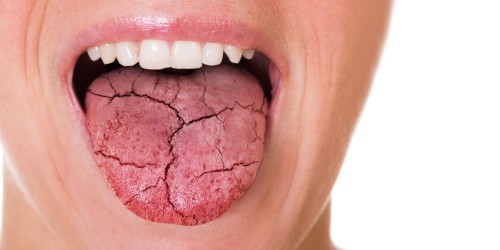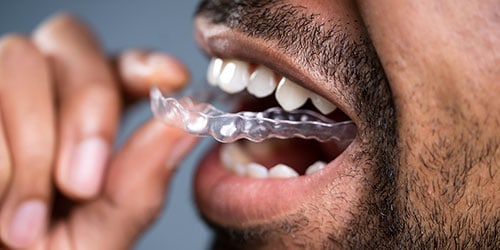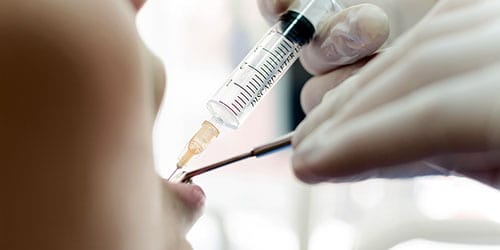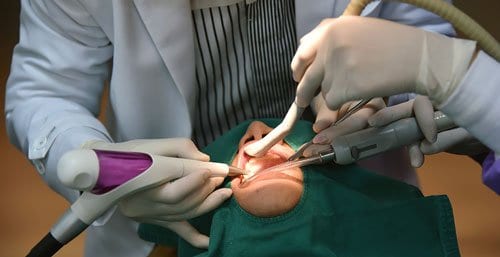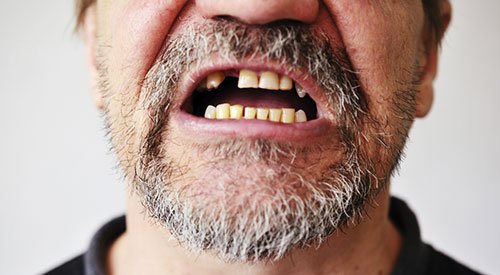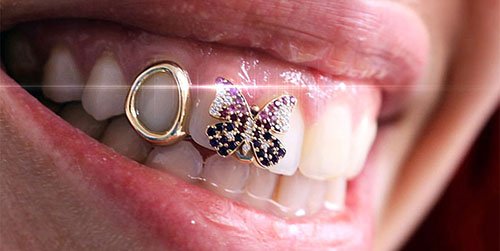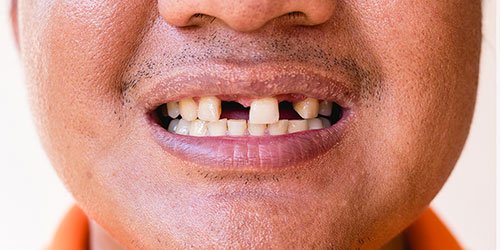Diabetes is a group of health conditions that can affect several of your body’s systems — including your oral health. Diabetes complications affecting the mouth are primarily caused by changes to your saliva, which lubricates your mouth and rinses away food particles, helping prevent tooth decay and gum disease.
Both diabetes and the medications for diabetes treatment can decrease saliva production, leading to dry mouth (xerostomia) and increasing the risk of cavities and periodontal disease.
Knowing the risk is the first step to protecting your oral health.

What is diabetes?
In diabetics, the body doesn’t produce enough insulin or uses it inefficiently, resulting in high blood sugar levels. There are three types of diabetes: type 1 diabetes, type 2 diabetes, and gestational diabetes.
Diabetes type 1 and 2 are chronic health conditions, whereas, gestational diabetes occurs during pregnancy and usually subsides shortly after delivery.
Common diabetes complications include kidney disease, heart disease, nerve damage, and problems with oral health.
What is periodontal disease?
Periodontal disease is a serious infection of the gums. It is categorized into four stages of severity and (if left untreated) can result in tooth loss and deterioration of the jaw bone.
The mildest form (gingivitis) results in swollen, bleeding gums that feel tender. Gingivitis is treatable and reversible, but when left untreated, it can progress to periodontitis.
Gum disease can damage the tissues that hold the roots of the teeth in their sockets. As the infection progresses, your gums may recede, leading to loose teeth, and you may have more tooth decay and bad breath.
In some cases of severe periodontal disease, tooth loss is unavoidable. The infected tooth or teeth must be removed and replaced by dental implants. As the condition worsens, infection can spread to the jawbone and surrounding tissues, further deteriorating oral health.
The relationship between diabetes and periodontal disease
The link between gum disease and diabetes is multifaceted. Besides the oral health problems caused by insufficient saliva, elevated blood sugar levels increase fatty deposits inside the blood vessels. As these deposits build up, the blood vessels narrow, restricting blood flow. Poor circulation in the jaw and oral cavity can weaken the bone and gums, increasing their susceptibility to bacteria growth and subsequent infection.
One study found that individuals with diabetes were 39% more likely to have periodontal disease than those without the health condition.
Aside from periodontal disease, individuals with diabetes may experience other mouth problems, such as ulcers, tartar build-up, increased risk of thrush, and cavities.
How does periodontal disease affect diabetes?
Not only can diabetes put you at higher risk of developing periodontitis, but gum disease is thought to adversely affect glycemic control.
The American Diabetes Association states that the inflammation caused by gum disease can contribute to elevated blood sugar levels. In turn, raised blood glucose levels can lead to a higher risk of diabetes or diabetes complications.
More and more studies are showing that periodontal disease has a negative impact on overall health — and potentially even mental health.
How can I prevent dental problems due to diabetes?
Dental health and diabetes care go hand in hand. Controlling your blood glucose levels through treatment and lifestyle management is just as important for preventing periodontitis as getting regular checkups from your dentist and taking good care of your teeth. Daily dental care, such as brushing with a soft-bristled toothbrush and fluoride toothpaste, is essential, as is scheduling regular dental appointments.
If you notice any signs of gum disease, it is recommended that you consult a periodontist. With early intervention, our doctors may be able to restore your oral health and prevent your gum disease symptoms from worsening.
Our board-certified periodontists at MD Periodontics specialize in gum disease, offering deep cleaning of the teeth through scaling and root planing. These procedures help remove bacteria from the teeth and gum tissue, preventing it from spreading to the bone. Our expert periodontists are also skilled in implant dentistry and restoration for advanced cases of periodontal disease.
Choose MD Periodontics for your beautiful, healthy smile!
MD Periodontal is the premier periodontal facility for high-quality dental care, including treating diabetic teeth and gum problems. Located in Beverly Hills, we provide a wide range of dental services. Our patients are not only local but come to us from around the globe.
Our two board-certified periodontists and their highly qualified, dedicated, and professional healthcare staff form a team that provides top-of-the-line technology and skills earned from extensive experience so you can have the best smile as well as the best oral health.
Schedule a consultation online or call us at (310) 859-9449. A spa-like atmosphere, staffed by a team who truly cares about your smile, awaits you!
MD Periodontics is conveniently located for patients throughout the metropolitan Los Angeles area. Our board-certified periodontists and implant dentistry experts are available at locations in or near Beverly Hills, Santa Monica, West Los Angeles, Culver City, West Hollywood, Downtown Los Angeles, Marina del Rey, Pacific Palisades, Malibu, Manhattan Beach, Sherman Oaks, and Encino.
- How to Care for Dental Implants: Advice From the Professionals - June 25, 2024
- The Surprising Link between Diabetes and Gum Disease - May 17, 2024
- The Power of MD Perio’s 3D Dental Scanner Workflow - April 15, 2024
 (310) 859-9449
(310) 859-9449 The Surprising Link between Diabetes and Gum Disease
The Surprising Link between Diabetes and Gum Disease
 or call us at
or call us at 















